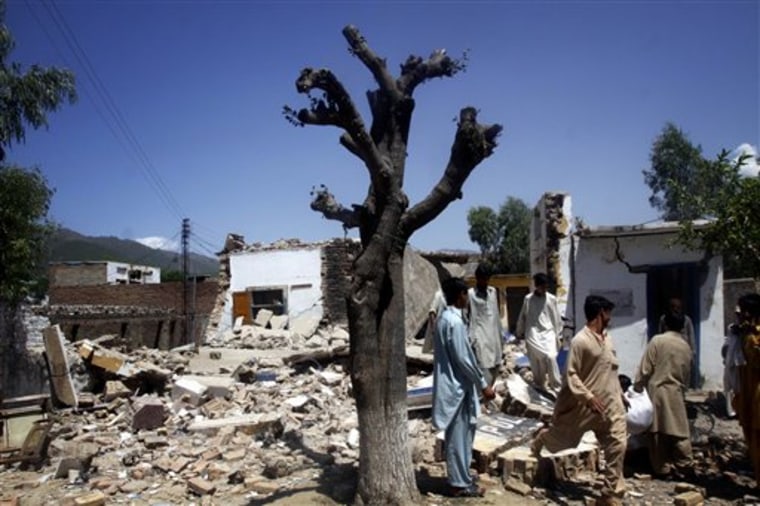The number of terrorist attacks around the world fell by 18 percent last year but rose dramatically in Pakistan, growing in frequency and lethality, the U.S. State Department said Thursday.
The department's annual assessment of global terrorism said al-Qaida and its affiliates continue to be the greatest terrorist threat to the United States despite ongoing efforts to disrupt their operations in Afghanistan, Pakistan, Iraq, North Africa, Somalia and Yemen. Terrorist attacks also rose in Afghanistan last year, the report said.
Worldwide terrorist attacks dropped to 11,770 in 2008 from 14,506 in 2007. The number of deaths caused by those incidents declined 30 percent, from 22,508 in 2007 to 15,765 last year.
19 American civilians died in 2008
According to statistics compiled for the report by the National Counterterrorism Center, 19 American civilians died in terrorist-related incidents last year compared to 33 the previous year.
Despite those positive signs, the rise of incidents in Pakistan, the report said, reflected increased "coordination, sophistication and frequency" of suicide and other bombings by the Taliban and al-Qaida.
Attacks in Pakistan more than doubled between 2007 and 2008 to about 1,800 and have quadrupled since 2006. Militants have expanded and consolidated their operations during that period, mainly along the northwest border with Afghanistan and in largely ungoverned tribal areas.
"They have used this terrain as a safe haven to hide, train terrorists, communicate with followers, plot attacks and send fighters to support the insurgency in Afghanistan," the report said.
Attacks in Pakistan shot up from 890 in 2007 to 1,839 in 2008 with a corresponding rise in fatalities from 1,340 to 2,293, according to Russell Travers of the counterterrorism center. In Afghanistan, the number of attacks rose from 1,125 in 2007 to 1,220 in 2008, killing 1,989 people last year, up from 1,961 the year before, he said.
"The spike in Pakistan represents one of the reasons why the (Obama administration has) chosen to devote an enormous amount of political attention and an enormous amout of diplomatic activity and resources to the question of Pakistan and Afghanistan," said State Department counterterrorism coordinator Ronald Schlicher.
Attacks in Iraq fall by nearly 50 percent
The rises in Afghanistan and Pakistan bucked the overall downward trend that included a sharp decline in Iraq, where the number of terrorist incidents fell nearly 50 percent.
The drop in incidents in Iraq, to 3,259 in 2008 from 6,210 in 2007, was due to the diminishing threat there from al-Qaida, which has been hit with significant defections, the report said.
Largely due to the drop in attacks in Iraq, the number of suicide bombings declined worldwide, despite the increases in Pakistan and Afghanistan, the report said.
By November 2008, it said Pakistan had recorded 57 suicide attacks, compared to 45 in all of 2007, most of which hit high-profile government, military and civilian targets, including the massive Sept. 20 truck bombing of the Marriott Hotel in Islamabad that killed at least 60 people, including two Americans, and injured more than 200.
Pakistan-affiliated militants were blamed for perhaps the most well-coordinated terrorist strike in 2008, the Nov. 26 attacks in Mumbai, India. It targeted hotels, a Jewish center and other locations and killed at least 183 people, including 22 foreigners, of whom six were Americans.
"The terrorists appeared to have been well-trained and took advantage of technology, such as Global Positioning System trackers," the report said.
It noted that India continues to rank among the world's most terrorism-afflicted countries and that "the rise in terrorist attacks and their coordinated nature throughout India suggest(s) the terrorists were well-funded and financially organized."
Report warns of al-Qaida threat
Elsewhere, the report said al-Qaida and its affiliates continued to pose threats, particularly in Algeria, where nearly 80 people were killed in attacks in August alone, and Yemen, Osama bin Laden's ancestral home where the U.S. embassy was attacked in September, killing 18 people, including one U.S. citizen.
"The security situation in Yemen deteriorated significantly over the past year as al-Qaida in Yemen increased its attacks against Western and Yemeni government institutions," the report said.
In Somalia, the report said the al-Shabaab militant group continued to take advantage of a power vacuum in the country and was providing "safe haven" to al-Qaida "elements" wanted for the 1998 bombings of the U.S. embassies in Kenya and Tanzania. The report also noted that an American was responsible for a suicide bombing in Somalia in 2008.
As it has for the past decade, the report identifies Iran as the main state sponsor of terrorism, focusing in particular on trying to disrupt Arab-Israeli peace efforts by supporting groups such as Lebanon's Hezbollah movement, Hamas and Palestinian Islamic Jihad.
Although the report said Iranian-backed violence in Iraq was down, it accused Iran of transferring weaponry to select members of the Taliban in Afghanistan.
